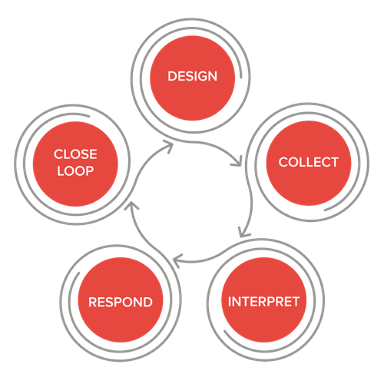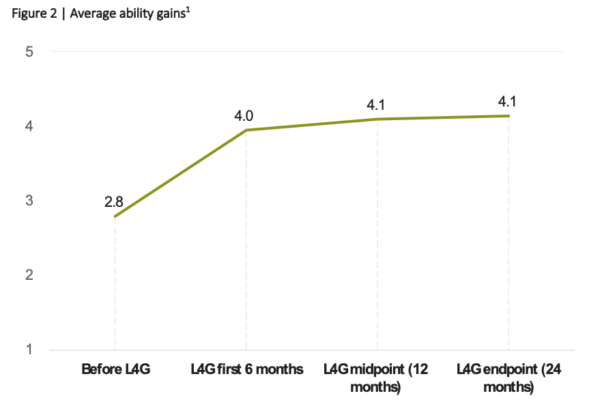Juan Clavijo & Melinda Tuan | April 12, 2021
Responses on a client survey last year sent clear signals to Compass Working Capital that it needed to make changes to an upcoming program about personal finance issues during the COVID-19 pandemic. Instead of running a webinar series on the topic as originally planned, the Massachusetts financial-services nonprofit switched to sharing information and resources in ways clients said they preferred — through emails and texts. The survey sparked broader and deeper changes at the organization, too. In response to clients expressing interest in having ongoing opportunities to provide feedback, Compass established a 12-person client advisory board, incorporated regular client feedback into experimentation around service delivery, and created a peer-to-peer network to connect and amplify client voices.
The promise of high-quality feedback
Stories like this one from Compass Working Capital demonstrate the promise of feedback – its ability to inform programmatic or strategic changes and build stronger, more equitable relationships between nonprofits and their clients. But not all feedback is the same.
Six years ago, Fund for Shared Insight launched a feedback initiative, Listen4Good, based on the idea that for feedback to be of greatest use to organizations and empowering to clients, the process must be framed as a loop that includes designing, collecting, interpreting, responding, and reporting back to survey-takers (figure 1). And the Listen4Good hypothesis was that many organizations need capacity-building support to implement such high-quality feedback loops. Now, as you’ll read from the experiences and data shared here, we have evidence to support this thinking.
High-quality feedback requires commitment, staff with time and specific technical abilities, a learning culture open to continuous improvement, and a conviction that clients are best positioned to help design services that reflect their needs, preferences, and aspirations. Through its capacity-building approach, Listen4Good has supported nearly 550 direct-service nonprofits in implementing high-quality feedback loops to learn from, meaningfully connect with, and amplify the voices of their clients.
Figure 1 | Listen4Good’s five-step feedback loop

The benefits of capacity-building for feedback
Since 2016, ORS Impact, Shared Insight’s learning and evaluation partner, has followed six of the nine cohorts of nonprofits implementing high-quality feedback loops through Listen4Good.1 Earlier cohorts participated in Listen4Good for 24 months, while more recent cohorts participated in an 18-month program, with some cohorts receiving additional time due to COVID-19. From our interactions with these Listen4Good-participating organizations, we have learned about the benefits of feedback work and about the types of changes organizations experience during the capacity-building process.
A key aspect of capacity-building is strengthening a nonprofit’s technical abilities to implement high-quality feedback loops. Improving these abilities allows nonprofits to collect feedback that is relevant and useful for decision-making. Stronger technical capabilities around feedback can also translate to increased organizational capacity to engage in other measurement activities. After just six months of participating in Listen4Good, nonprofits reported, on average, an increase of more than one point on a five-point scale in their abilities to implement surveys, achieve high response rates, collect useful data, analyze data, interpret data, use data to improve programs, and close the loop with clients. Figure2 shows the average change over time and how these gains are sustained throughout the two-year engagement in the initiative.
Figure 2 | Average ability gains

As staff at Listen4Good-participating nonprofits put their new feedback skills to work, the organizations reported feeling better equipped to make changes in response to feedback and to include clients in designing program improvements. They also said their increased capacity built through Listen4Good helped steer their organization’s culture to value client feedback and client engagement more broadly.
According to the Listen4Good evaluation data, among participating organizations in the first three cohorts3:
- 85% reported gaining insights from feedback data;
- 81% reported making changes to programs, services, operations, or staff-client interactions;
- and 92% reported at least moderate impact on program effectiveness, while 75% and 72% reported impact on organizational culture and values, respectively.
The data also showed that once nonprofits started building feedback capacity and culture, they were likely to continue to expand their listening and survey efforts. Not only did many Listen4Good organizations increase their feedback work with clients, but they also implemented high-quality feedback loops with other stakeholders, such as staff and volunteers. In addition, a majority of Listen4Good organizations have sustained their feedback work beyond their initial two-year capacity-building period, with these practices persisting despite challenging circumstances, including the COVID-19 pandemic.
Further developments demonstrate the profound impact of building capacity for high-quality feedback in service of equity. We have seen Listen4Good-participating organizations, such as Compass Working Capital, use regular client surveys as a jumping-off point to forge even deeper partnerships with clients that shift power and create greater equity. Nonprofits report starting community councils and advisory boards or adding former clients to their staff or board of directors. In one recent case, an organization that participated in Listen4Good in 2016 shared how its ongoing feedback and power-sharing work established the necessary bonds and trust to enable candid and productive conversations with its young clients following George Floyd’s murder.
Moving forward
The feedback field has continued to grow and evolve over time. There is now a clearer understanding of what feedback entails and what it takes to implement high-quality feedback loops. Academics, funders, nonprofits, and other practitioners and allies are contributing to more knowledge, capacity, and enthusiasm about feedback in the social sector, while new governance and incentive structures are doing more and more to promote feedback work. Feedback Labs boasts more than 600 network members; 800 funders have signed the Council on Foundations’ COVID-19 pledge, which includes a commitment to listening to people and communities; and almost 7,500 nonprofits have shared information about their feedback practices in the new How We Listen section of their GuideStar by Candid profile, which is also now included in Charity Navigator’s ratings system. Listen4Good, which to date has partnered with 115 funders sponsoring hundreds of participating nonprofits, is continuing to scale its efforts with two new programs this year: Listen4Good Online+ and Listen4Good Premium.
We see all this activity as meaningful progress. Our evaluations demonstrate that the resources, tools, and coaching provided by Listen4Good can incentivize, leverage, and improve nonprofits’ feedback skills and listening culture, advancing equity and better serving the people and communities at the heart of their work. With continued energy and effort, particularly around capacity-building, we believe that in the coming years, high-quality feedback can become a more widely adopted, supported, and, even, expected practice in philanthropy and across the sector.
1 Listen4Good has launched a total of nine cohorts but ORS Impact has not yet surveyed the three most recent.
2 Data reflects average gains in ability measures across 86 L4G organizations across the 2016, 2017, and 2018 cohorts for whom we have collected and analyzed complete data across 24 months of engagement.
3 The Listen4Good Journey So Far, ORS Impact, 2020: https://d35kre7me4s5s.cloudfront.net/wp-content/uploads/2020/04/07110557/The-LISTEN4GOOD-Journey-So-Far-ORS-Impact-Final-3.23.20-002.pdf
More about the authors
 Juan Clavijo manages ORS Impact’s evaluation and learning partnership with Fund for Shared Insight. He also works on evaluation projects involving housing authorities, school districts, and policy advocacy around racial-equity issues. Juan recently moved back to the Pacific Northwest after living and working in Latin America, including in his home country, Colombia, as a consultant, focusing on politics and social policy monitoring and evaluation for clients, such as USAID and Univision Network.
Juan Clavijo manages ORS Impact’s evaluation and learning partnership with Fund for Shared Insight. He also works on evaluation projects involving housing authorities, school districts, and policy advocacy around racial-equity issues. Juan recently moved back to the Pacific Northwest after living and working in Latin America, including in his home country, Colombia, as a consultant, focusing on politics and social policy monitoring and evaluation for clients, such as USAID and Univision Network.
 Melinda Tuan (she/her) is the Managing Director at Fund for Shared Insight where she guides and facilitates operations, communications, grantmaking, evaluation, and more. As an independent consultant to senior leadership at philanthropic organizations around the country, Melinda promotes, crafts, and implements strategies for effective philanthropy.
Melinda Tuan (she/her) is the Managing Director at Fund for Shared Insight where she guides and facilitates operations, communications, grantmaking, evaluation, and more. As an independent consultant to senior leadership at philanthropic organizations around the country, Melinda promotes, crafts, and implements strategies for effective philanthropy.
Prior to starting her consulting practice in 2003, Melinda co-founded and ran REDF, a social venture capital fund; served as a manager at a national healthcare nonprofit; and worked as a management consultant. She enthusiastically brings her unique combination of business, leadership, evaluation, and management skills to helping mission-oriented organizations meet their goals, care for people, and better the world in which we live. Melinda can be reached at [email protected] or on Twitter at @MelindaTuan.
More about Fund for Shared Insight
 Fund for Shared Insight is a national funder collaborative promoting high-quality listening and feedback in service of equity. Their signature initiative, Listen4Good, advances constituent feedback as a complement to monitoring and evaluation with the goal of helping nonprofits and foundations be more responsive to the needs, preferences, and opinions of the people and communities they seek to benefit and serve. You can learn more about the work they support at fundforsharedinsight.org.
Fund for Shared Insight is a national funder collaborative promoting high-quality listening and feedback in service of equity. Their signature initiative, Listen4Good, advances constituent feedback as a complement to monitoring and evaluation with the goal of helping nonprofits and foundations be more responsive to the needs, preferences, and opinions of the people and communities they seek to benefit and serve. You can learn more about the work they support at fundforsharedinsight.org.
This blog was updated on 4, October 2021 to reflect Listen4Good’s new independent website URL.







